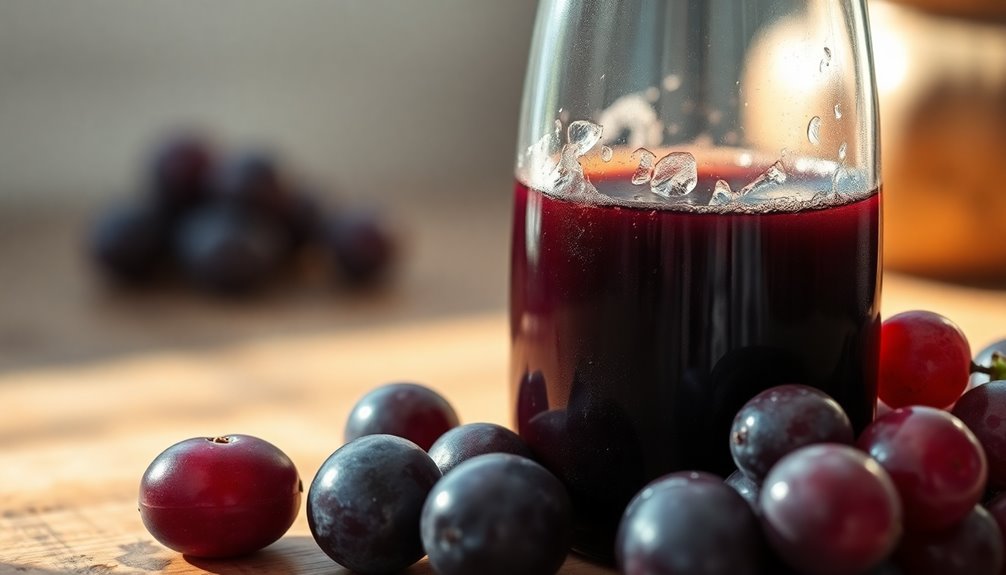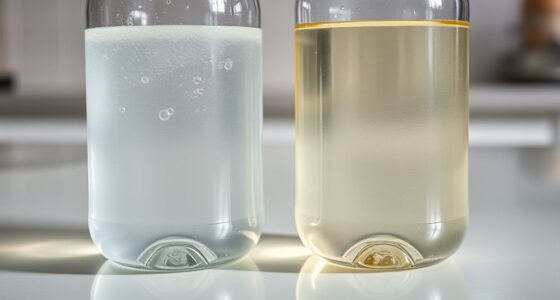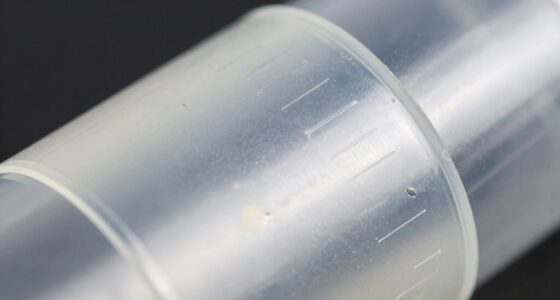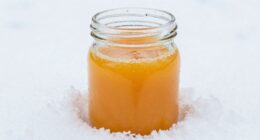Grape juice can last quite a while, but it all depends on how you store it. Unopened store-bought juice can stay good for up to 18 months, while once opened, it's best to drink it within 7-10 days. Freezing it extends the shelf life to 8-12 months. Keep it in airtight containers, away from light and humidity. Want to know what helps grape juice last longer and how to spot spoilage? Keep going!
Key Takeaways
- Unopened commercial grape juice can last up to 18 months when stored properly in a cool, dry place.
- Once opened, grape juice should ideally be consumed within 7-10 days for best quality.
- Freezing grape juice can extend its shelf life to 8-12 months while preserving flavor and nutrients.
- Pasteurized grape juice generally has a longer shelf life compared to fresh-squeezed varieties.
- Signs of spoilage include color changes, cloudiness, mold, and off-putting smells or flavors.
Understanding Shelf Life of Grape Juice
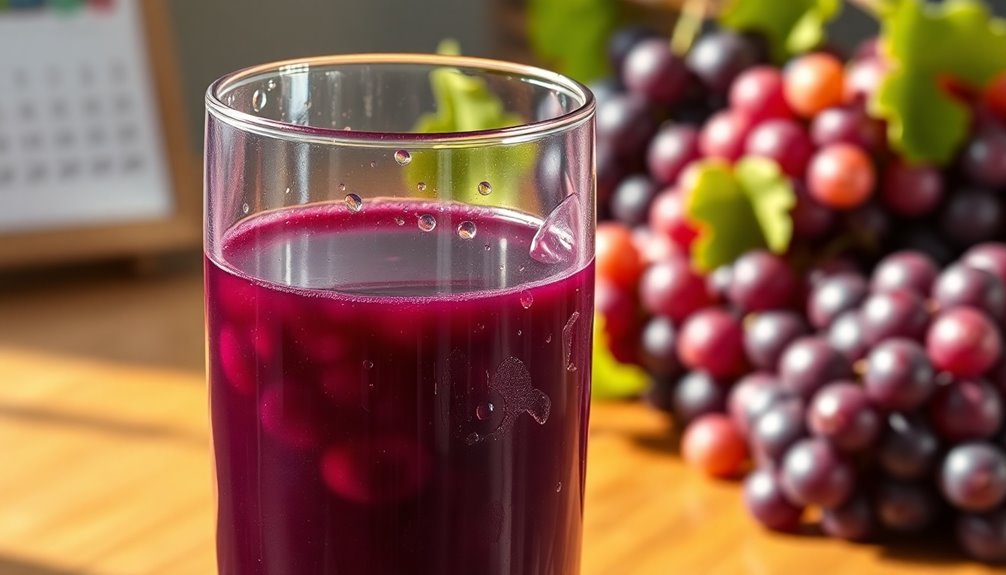
Have you ever wondered how long grape juice really lasts? The shelf life of grape juice varies significantly based on several factors.
Store-bought varieties generally outlast homemade ones, thanks to preservatives. Pasteurized juice also tends to last longer than fresh-squeezed options because of the heat treatment it undergoes. If you keep unopened commercial grape juice in a cool, dry place, it can last up to 18 months. Once opened, it's best consumed within 7-10 days. Interestingly, proper storage can significantly impact the freshness and nutritional value of grape juice, ensuring it remains safe for consumption. Freezing grape juice can extend its life to 8-12 months while maintaining optimal flavor.
Proper Storage Techniques
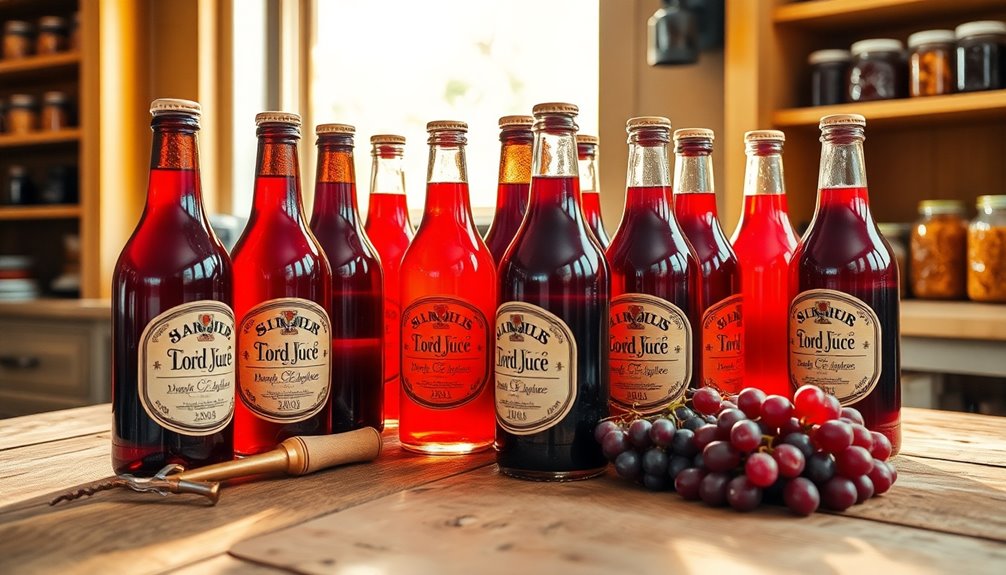
When it comes to extending the shelf life of grape juice, proper storage techniques play a crucial role.
First, choose food-grade containers like stainless steel or glass, and make sure they're airtight to prevent oxidation. Cleanliness is key, so always use clean containers and label them with contents and storage dates.
Store your grape juice in the refrigerator at a steady temperature between 0°C and 4°C, or freeze it at -18°C for longer preservation. This is important because freezing of grape concentrate is an effective long-term preservation method that helps maintain the quality of the juice.
Keep it away from direct sunlight and maintain a controlled humidity level to avoid spoilage. If possible, use dark or opaque containers and monitor storage conditions regularly to ensure everything stays fresh.
Following these techniques will help you enjoy your grape juice for much longer!
Factors That Impact Longevity
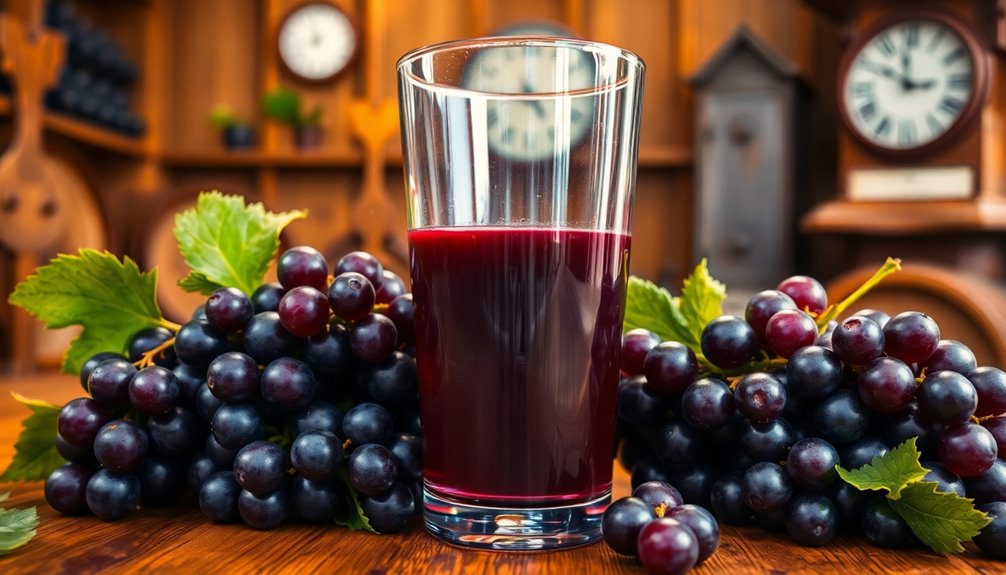
Proper storage techniques lay the groundwork for preserving grape juice, but several factors significantly influence its longevity.
The processing method matters; pasteurized juice lasts longer due to heat treatment, while unpasteurized options spoil faster. Juice made from concentrate may outlast fresh varieties because of lower water content. Additionally, the presence of antioxidant compounds in grape juice can also help maintain its quality over time.
Added preservatives can extend shelf life, as can refrigeration at or below 40°F (4°C). Light exposure and humidity also play roles; keeping juice in dark, low-humidity environments helps maintain its quality.
The packaging type is crucial too; glass bottles and Tetra Paks offer better protection than cartons.
Finally, adding ginger can enhance longevity due to its antimicrobial properties, while higher sugar content might impact health benefits but could prolong shelf life.
Identifying Signs of Spoilage
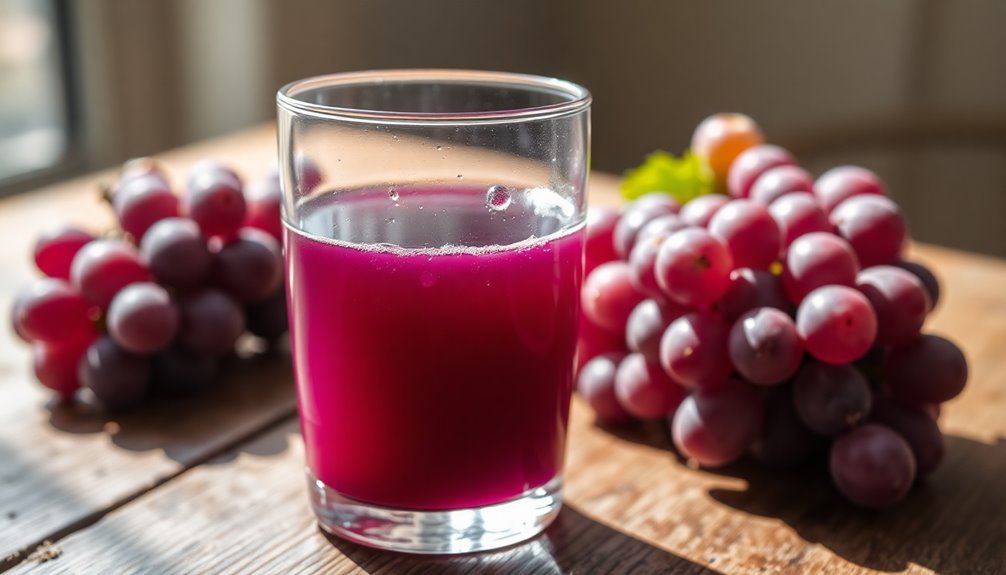
To ensure your grape juice remains safe and enjoyable, it's essential to recognize the signs of spoilage. First, check for color changes; if the juice darkens or looks significantly different, it might be bad.
Cloudiness or sediment at the bottom is another red flag. Look out for visible mold or yeast on the surface, and avoid any bulging or swollen containers, which suggest fermentation. Additionally, keep in mind that excess humidity promotes mold growth, which can accelerate spoilage.
Next, trust your nose—if you detect a sour, funky, or vinegar-like smell, it's time to discard it.
Lastly, taste matters; any unusual or sour flavor indicates spoilage. If you notice bitterness or an unpleasant aftertaste, it's best to throw the juice away. Always prioritize your health and safety!
Health Benefits of Grape Juice
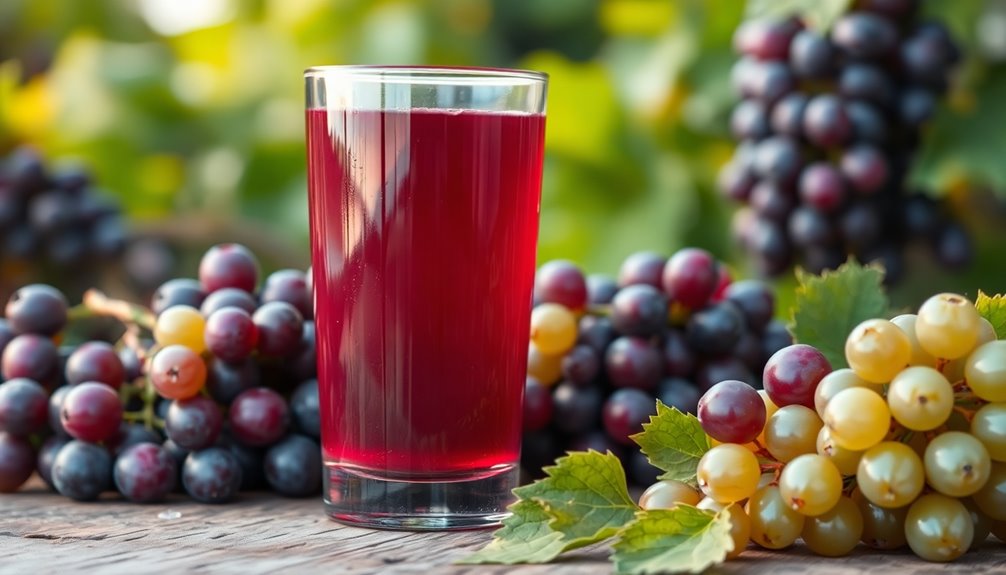
Grape juice isn't just a delicious beverage; it also packs a punch when it comes to health benefits. Rich in antioxidants, it helps eliminate free radicals, reducing oxidative stress and the risk of chronic diseases. The resveratrol and polyphenols in grape juice support heart health by lowering blood pressure and improving circulation. You'll also boost your immune system with its vitamins, making it easier to combat infections. Additionally, grape juice is known for its heart health benefits, helping to reduce bad cholesterol levels and increase good cholesterol levels. With its fiber content, grape juice aids digestion and prevents constipation. Plus, its potassium levels help regulate blood pressure. Regular consumption of grape juice can also support cognitive development in children, contributing to their overall well-being. Don't forget the potential benefits for diabetes management and cancer prevention, along with promoting healthy skin and hair. Enjoying grape juice can be a tasty way to support your overall well-being!
Creative Uses in Cooking and Baking

While you might think of grape juice as just a refreshing drink, it can also elevate your culinary creations in exciting ways.
Use grape juice as a key ingredient in a delicious grape juice pie, blending it with sugar and cornstarch for a thick filling.
Try a lemon and grape curd cake, layering grape juice with zesty lemon flavors. You can create grape-infused desserts like muffins or cheesecakes, adding a fruity twist.
In savory dishes, whip up grape-based marinades for meats or sauces that bring a sweet and tangy flair.
For a unique treat, reduce grape juice into a syrup for drizzling over desserts or mix it with chocolate for a delightful twist on cookies.
The Role of Color and Taste Perception
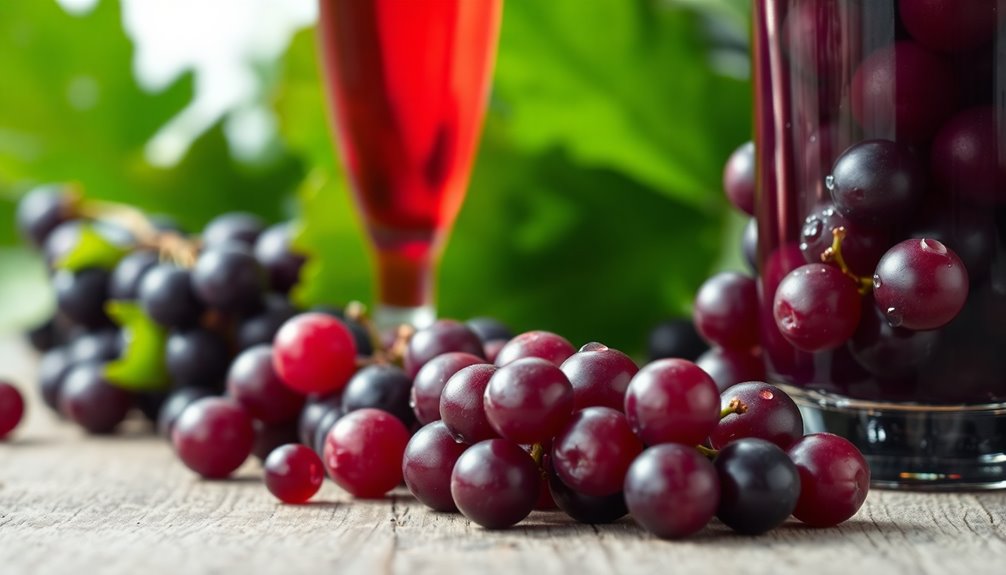
When you take a sip of grape juice, the vibrant color plays a crucial role in shaping your taste experience. That rich purple hue not only signals sweetness but also enhances your perception of flavor intensity. Studies have shown that color affects flavor intensity, especially in how we perceive sweetness in beverages. Additionally, the psychological impact of essential oils can also enhance sensory experiences, including taste perception.
If you see a bright red shade, you might expect a sweeter taste, while a duller color could suggest bitterness. Surprisingly, your brain can override actual flavors based on these visual cues. Even if you know the color doesn't match, your expectations can still sway your taste perception. This psychological effect illustrates how important color is in your enjoyment of grape juice, influencing your overall experience and even shaping your expectations about quality and freshness.
Freezing Grape Juice: A Viable Option
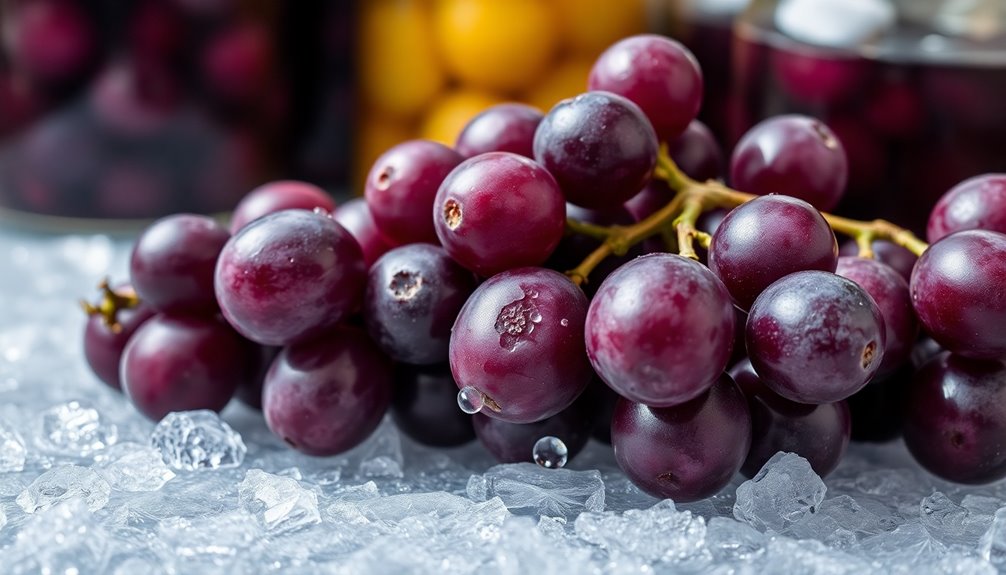
Freezing grape juice is a great way to extend its shelf life and maintain its quality. When you freeze it, remember that juice expands, so use containers with enough headroom to avoid bursting.
Opt for airtight, freezer-safe containers or heavy-duty bags to keep out air and prevent freezer burn. Seal them tightly and label each with the freezing date for easy tracking. While freezing preserves most nutrients, some may degrade over time. You can store frozen grape juice for several months without significant quality loss. Additionally, fresh juice should be kept chilled to halt fermentation and maintain its quality.
When you're ready to enjoy it, thaw the juice in the refrigerator or at room temperature. This method is cost-effective, convenient, and keeps the flavor intact better than other preservation methods!
Frequently Asked Questions
Can Grape Juice Be Stored in Plastic Containers?
Yes, you can store grape juice in plastic containers, but make sure they're food-grade to avoid chemical contamination.
Choose airtight containers to keep out air and light, which can spoil the juice. If you're using larger containers, consider transferring to smaller ones for home use.
Always store the juice in a cool, stable environment, and remember to check for spoilage signs before consuming.
Proper storage will help maintain its quality.
Does Homemade Grape Juice Have a Different Shelf Life?
Homemade grape juice typically lasts about 5-7 days in the refrigerator, which is significantly shorter than the 6-12 months unopened store-bought juice can last. To extend the shelf life of homemade grape juice, it’s important to store it in an airtight container and keep it at a consistent, cold temperature. Unlike homemade versions, commercially produced juices often contain preservatives that significantly prolong their freshness. Similarly, when considering grapefruit juice storage duration, homemade varieties should also be consumed more promptly than their store-bought counterparts to ensure optimal flavor and safety.
This difference arises because homemade versions lack preservatives.
If you want to extend its shelf life, consider freezing the juice, as it can last several months when stored properly.
Always check for spoilage signs like changes in color or smell to ensure your juice is still good to drink.
Is It Safe to Drink Grape Juice Past Its Expiration Date?
It's generally safe to drink grape juice past its expiration date if it's been stored properly.
Just keep an eye out for signs of spoilage like off smells, changes in color, or a sour taste. If the juice looks and smells fine, it's likely okay to consume.
Always remember to refrigerate it and use airtight containers to extend its freshness, ensuring you enjoy the best flavor and safety.
Can Grape Juice Be Used for Fermentation Purposes?
You can't make wine without crushing some grapes!
Yes, grape juice can definitely be used for fermentation purposes. By adding yeast to the juice, you kickstart the fermentation process, converting sugars into alcohol and carbon dioxide.
Remember, factors like sugar content and temperature play a crucial role in how well it ferments.
Just keep an eye on it to avoid spoilage, and you might just end up with some homemade wine!
How Does Pasteurization Affect Grape Juice Flavor?
Pasteurization affects grape juice flavor by altering its natural characteristics.
While it's designed to eliminate harmful microbes, the heat can lead to subtle changes in taste and aroma. You might notice some varieties retain their flavor well, while others may lose some of their fresh, fruity notes.
Additionally, pasteurization can reduce nutrients, impacting the overall quality.
If you value natural flavors, consider alternatives like high-pressure processing for better retention.
Conclusion
So, there you have it! Grape juice can last longer than your favorite sitcom reruns if you store it right. With proper techniques, you'll unlock its full potential, ensuring it stays delicious and safe to sip. Just keep an eye out for any signs of spoilage—because nobody wants a surprise party for their taste buds! Embrace the health benefits, unleash your culinary creativity, and remember: frozen grape juice might just be the superhero your kitchen needs!
Susannah expertise lies in researching and compiling evidence-based content on juicing, nutrition, and overall health. She is committed to ensuring that The Juicery World offers accurate, up-to-date, and trustworthy information to empower readers to take control of their health. Susannah’s goal is to inspire individuals to embrace juicing as a way to nourish their bodies and live their best lives.

